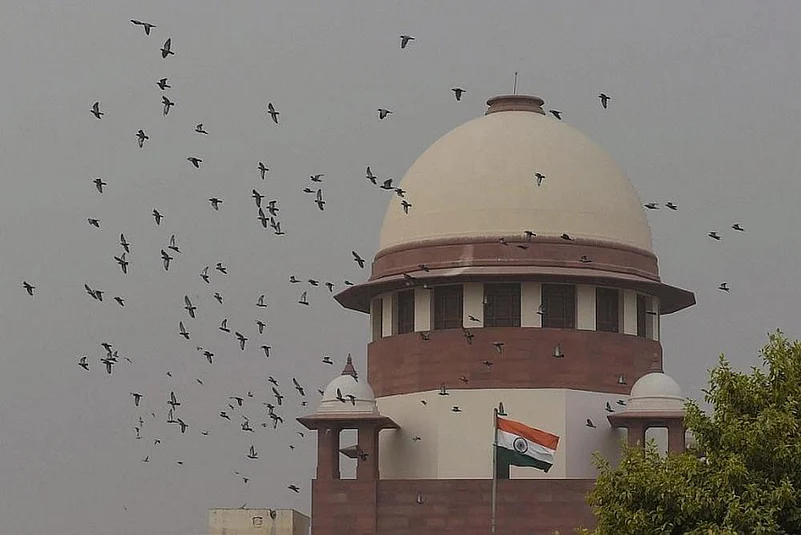How much does the Bharatiya Janata Party (BJP) owe its rise to the December, 1995 ruling of a three-judge bench of the apex court headed by J S Verma? A lot, believe several commentators and jurists including A.G. Noorani and V.M. Tarkunde among others who severely criticised the ruling that held Hinduism was a ‘way of life’ and that Hindutva stood for ‘Indianness’ and it united every Indian.
The bench had concluded that invoking Hinduism and Hindutva in election campaigns was actually fine despite Section 123(3) of the Representation of People’s Act prohibiting the use of religion during election campaigning.
The bench set aside a Bombay High Court ruling which had earlier disqualified nine elected MLAs, including Manohar Joshi, of the Maharashtra Assembly.
Manohar Joshi had sought votes in order to establish a ‘Hindu Rashtra’ in Maharashtra. It also ignored the provocative speeches of Shiva Sena chief Bal Thackeray who, in his speeches, declared that he did not care for the votes of Muslims as the Shiva Sena was fighting for the protection of Hinduism.
Curiously, the Supreme Court has now begun hearing an appeal pending since 1991, which was somehow not disposed of by the bench headed by Justice Verma. Nor has any Chief Justice of India since 1996 heeded to the recommendation of another three-judge bench headed by Justice K Ramaswamy which differed with Justice Verma and felt that a bigger Constitution bench ought to decide on the issue.
Parliament and the Election Commission of India have been silent on the ‘Hindutva’ ruling which effectively destroyed Section 123(3) of the Representation of People Act enacted by Parliament and which still remains a part of the law.
Successive Chief Justices have also not bothered to constitute a bigger bench during the last 20 years. Letting sleeping dogs lie was clearly considered a prudent policy.
The present CJI Justice T.S. Thakur, therefore, needs to be complimented for breaking the code of silence and taking the bull by its horns. It’s a pity that he has taken it up when he has just two more months’ service left.
No matter what the final ruling in the case, he will always be blamed for taking up this controversial issue towards the fag end of his tenure.
But while seven judges of the Supreme Court continue hearing arguments (the next hearing is on October 26) on whether election campaigns invoking religion is ‘çorruption’ within the meaning of Section 123 (3) of the Representation of People Act, their observations in court have upset many right wing parties.
Elections, the bench observed this week, are a secular and political exercise and religion must be kept out of it.
Even at this early stage, it seems, almost certain that the Supreme Court will eventually reverse the ruling. But what remains uncertain is how political parties, the Election Commission and Parliament will react to such a reversal.
The EC in particular has been helpless in curbing brazen appeals made by different political parties during elections. And with elections taking place virtually every year, it will take a lot of effort and determination on their part to put the electoral process back on the rails. It is also uncertain whether any such effort by the EC to enforce Section 123(3) will be resisted by political parties and with what consequences.
A moot point is whether a judicial pronouncement will make much difference to the political establishment.
Religion has always played an important role in Indian politics. Prime Ministers have courted religious leaders, politicians have hosted ‘Iftar’ during the holy month of Ramzan, imams and swamis and priests have endorsed candidates and political parties have routinely cultivated different sects and ‘Deras’.
Religious issues like conversion, re-conversion, religion-specific housing, denial of employment on the basis of religion etc are also live political issues. The question, therefore, is where does one draw a line?

The BJP in particular has been at the forefront of pandering to ‘Hindu’ sentiment. By turning myths and metaphors into history, by promising the Ram temple at Ayodhya in its manifesto, it has dared common sense and dangerously flirted with the law in the past several elections. Will it honour the Supreme Court ruling? Since it had embraced the ruling of the bench headed by Justice Verma, there is no apparent reason to fear that it will not accept a contrary ruling with equally good grace. But one has to keep the fingers crossed.
If there is any maturity left in the political system, there should be deep introspection by political parties, serious deliberations and a consensus on how to keep religion out of politics. But there is little hope of the fractured system responding responsibly. That is the reason why one waits with trepidation the Constitution bench’s ruling on the contentious issue.
















